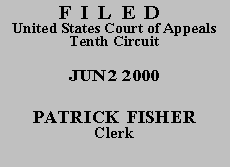

| CLIFFORD STEWART,
Petitioner-Appellant, v. MICHAEL ROGERSON, Acting Chief Probation Officer, Fourth Judicial District, State of Colorado; CHUCK TULISZEWSKI, Probation Officer; ATTORNEY GENERAL FOR THE STATE OF COLORADO, Respondents-Appellees. |
|
Clifford Stewart appeals from the district court's denial of his habeas petition, filed pro se pursuant to 28 U.S.C. § 2254. We have jurisdiction over this appeal pursuant to 28 U.S.C. §§ 1291 and 2253. Under the provisions of the Antiterrorism and Effective Death Penalty Act, appellant must obtain a certificate of appealability before his appeal can proceed before this court. See id. § 2253(c)(1)(A). The district court denied appellant a certificate of appealability. To proceed on appeal, therefore, he must demonstrate "a substantial showing of the denial of a constitutional right" before a certificate of appealability can issue in this court. See id. § 2253(c)(2).
Appellant was convicted of felony theft after trial to a jury. He was placed on probation and ordered to pay restitution in the amount of two million dollars. He presented two issues to the district court in his habeas petition: (1) that the trial court's restitution order violated the ex post facto provisions of the Constitution, and (2) that the verdicts returned by the jury were inconsistent and therefore constitutionally invalid. See R. Vol. I, doc. 1, at 4-5. He argues those same issues on appeal except that he has expanded the first issue into two arguments, one based on ex post facto and another on due process. Without determining whether the due process argument was presented to the district court, we have considered the two arguments together, as it appears they are essentially the same issue. To the extent that appellant raises other arguments not presented or addressed by the district court, however, we do not consider those. See Walker v. Mather (in re Walker), 959 F.2d 894, 896 (10th Cir. 1992).
Our review of the district court's disposition in light of appellant's arguments and the applicable law convinces us that, for substantially the reasons set forth in the magistrate judge's findings and recommendation, see R. Vol. I, doc. 23, appellant has not demonstrated the denial of a constitutional right. Accordingly, we DENY appellant a certificate of appealability and DISMISS this appeal. The mandate shall issue forthwith.
Entered for the Court
Circuit Judge
*. This order and judgment is not binding precedent, except under the doctrines of law of the case, res judicata, and collateral estoppel. The court generally disfavors the citation of orders and judgments; nevertheless, an order and judgment may be cited under the terms and conditions of 10th Cir. R. 36.3.